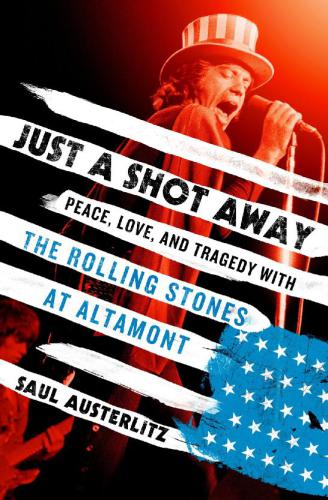
Just a Shot Away
Peace, Love, and Tragedy with the Rolling Stones at Altamont
کتاب های مرتبط
- اطلاعات
- نقد و بررسی
- دیدگاه کاربران
نقد و بررسی

Starred review from April 30, 2018
Austerlitz (Money for Nothing) offers a blistering exploration of the deadly confluence of racism, stoned naïveté, biker belligerence, and rockstar obliviousness that resulted in the murder of 18-year-old Berkeley arts student Meredith Hunter at the Rolling Stones’ infamously disastrous concert in Altamont, Calif. Hastily thrown together for December 1969 after the surprisingly peaceful success of Woodstock, Altamont, with its 300,000 attendees, was the biggest rock concert ever held in the Bay Area. But instead of hiring off-duty cops as security as Woodstock’s organizers did, the organizers of Altamont brought on a phalanx of Hells Angels, chummy with local hippie bands like the Grateful Dead, who thought of them with “misplaced confidence” as countercultural allies. The result, as hundreds of thousands of concertgoers swarmed the site, ingesting substances in a “full-on bacchanalia,” was the “hippie aesthetic of laissez-faire planning” slamming into a violent atmosphere as the Angels beat anyone who got too close to the stage. It was during the Stones’ set that the Angels “pummeled and stomped” Hunter after he pulled an unloaded pistol trying to ward off further beatings. Hells Angel Alan Passaro was brought to trial for stabbing him, but was acquitted on the grounds of self-defense. This is a deeply researched and colorfully written account of the disastrous symbolic end to the 1960s.

May 15, 2018
A historical retrospective on the dark side of the Summer of Love and the end of an era.As Austerlitz (Sitcom: A History in 24 Episodes from I Love Lucy to Community, 2014, etc.) notes, while the much-hyped Woodstock Festival came to symbolize the 1960s counterculture's utopian vision, "Altamont became an easy symbol of the failings of that hopeful time." The idea for the Altamont festival began with the Rolling Stones, who sought to bookend their North American tour with a free Woodstock-like event to be held in the San Francisco Bay Area. Featuring Santana, the Grateful Dead, and Jefferson Airplane, the poorly planned festival--thrown together last-minute at the unlikely Altamont Speedway--began without a hitch. However, before the night was over, violence reigned, culminating in the fatal stabbing of 18-year-old Meredith Hunter, one of few black concertgoers in attendance. Who to blame for Altamont's failure and Hunter's death? The racial turbulence of the times? The cavalier attitude of festival organizers? The violence-prone Hells Angels, hired for security? The Rolling Stones who hired them? The Grateful Dead, who were too high to play to a growingly restless audience? As Austerlitz amply demonstrates, it was all of this and more. Interviewing the likes of Jefferson Airplane guitarist Paul Kantner, Rolling Stone publisher Jann Wenner, filmmaker Joan Churchill, and Hunter's surviving family members, the author looks critically at this pivotal historical event while paying tribute to Hunter, who, as Austerlitz writes, "was not just a name, not just a dead man at a rock concert." Austerlitz also examines the Altamont documentary Gimme Shelter and the trial and acquittal of Hells Angel Alan Passaro, and he provides updates on the fates of the players involved in the day's unraveling.At turns critical and poignant, a thoroughly researched exploration of the ultimate price tag for the end of the 1960s.
COPYRIGHT(2018) Kirkus Reviews, ALL RIGHTS RESERVED.

June 15, 2018
Journalist and critic Austerlitz (Money for Nothing) takes a different approach to the infamous, disastrous, 1969 Altamont Music Festival, where Meredith Hunter, a young African American man, was stabbed and killed close to the stage by Hell's Angels hired to provide security for the Rolling Stones, Jefferson Airplane, and other bands who were performing. Although a thorough report of the festival is provided, much of the book focuses on the personalities involved in coordinating, managing, and filming the event. Austerlitz also discusses the making of the Maysles Brothers' 1970 documentary Gimme Shelter and provides an excellent account of Hunter's life via interviews with his friends and family, which is the most valuable part of the book. VERDICT Highly recommended for anyone interested in the history of rock music.--Todd Spires, Bradley Univ. Lib., Peoria, IL
Copyright 2018 Library Journal, LLC Used with permission.

Starred review from May 15, 2018
The Altamont Speedway Free Festival was supposed to be a high point of the music scene in 1969: a coming together of some of the hottest bands of the time (Santana, Jefferson Airplane, the Grateful Dead, and the Rolling Stones, among others) to offer up some of the very best music to their fans, free of charge. It turned into something else entirely: a symbol of the violence of the late 1960s. During the Stones' set, a young black man, Meredith Hunter, was killed after getting into a fight with members of the Hells Angels motorcycle gang, who had been contracted to work as security for the event. A murder trial followed, with the acquittal of the man who killed Hunter (the accused claimed self-defense). Austerlitz, who has written acclaimed books about American film comedy and music videos, explores the murder and its historical context in precise detail, offering readers much more than a superficial it was a violent time analysis. Instead, he discusses the ways in which the accused killer's trial fed off of, and contributed to, the racial conflict of the time, and the ways in which Altamont signaled am abrupt end to the free-spirited 1960s. A carefully constructed examination of an incident that changed the course of popular history.(Reprinted with permission of Booklist, copyright 2018, American Library Association.)

























دیدگاه کاربران